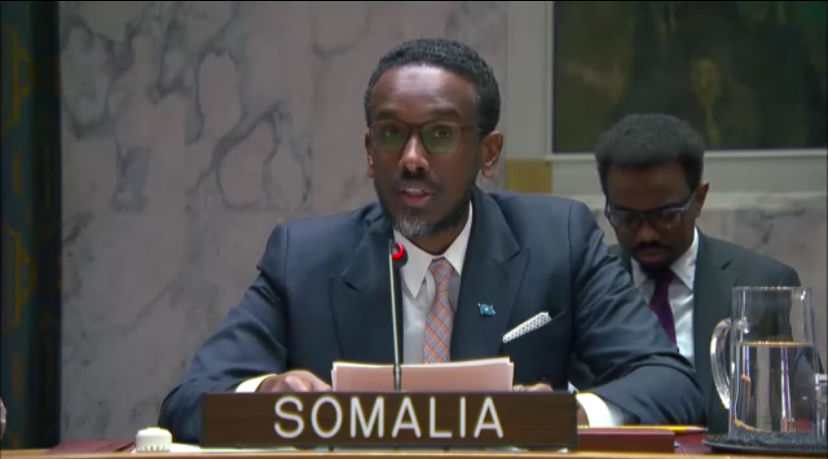Security Council’s Open debate on “Combating the Financing of Terrorism”
- Mar 29, 2019
- 3 min read
Statement by Ambassador Fatima K. Mohammed, Permanent Representative of the African Union to the United Nations
Security Council’s Open debate on “Combating the financing of terrorism”
Mr. President,
Allow me, at the outset, to congratulate you on assuming the presidency of the
Security Council for this month and to thank you for convening this important
open debate on “combatting the financing of terrorism”.
I would like to thank all briefers for their insightful presentations.
Mr. President,
Today’s debate is indeed all the more relevant as it takes place against the
background of ever increasing challenges to international peace and security.
And obviously, terrorism and violent extremism remain the most serious threat to
our world’s stability and development.
I wish to reiterate AU’s strong and unequivocal rejection of terrorism in all its
forms and manifestations as well as its strong condemnation of all terrorist acts,
which cannot be justified under any circumstances. I would like to reaffirm our full
solidarity with the affected countries and victims, whose plight should be fully
acknowledged and addressed. It is also our strong belief that terrorism cannot
and should not be associated with any religion, nationality or civilization.
Likewise, terrorism should not be equated with the legitimate struggle of peoples
under foreign occupation to achieve their inalienable right to self-determination.
In this regard, we note with major concern the growing capacity of terrorist
groups to finance their activities by, among others, running criminal/illicit
economies in areas under their control, engaging in illegal exploitation of, and
trade in, natural resources, kidnaping for ransom (KFR), arms, drugs and human
trafficking, and other types of transnational organized crime.
In our view, this situation gives rise to the following observations:
First, financing remains the major vulnerability of the different terrorist groups.
Indeed, the “success” of these groups in causing more atrocities largely depend
on their ability to adequately and sustainably finance the preparation, planning
and execution of terrorist attacks. Therefore, there is an urgent need for more
concerted and coordinated efforts by Member States to effectively deny terrorist
groups any source of funding, including payment of ransom as well as any form
of military, logistical or political support.
Second, if we are to effectively prevent and suppress the financing of terrorist
acts, we need to take fully into account the terrorist’s continued ability to adapt
their methods and innovate to meet their financing needs.
In this vein, there is increasing evidence that terrorists are turning to
transnational organized crime networks to generate funding and acquire logistical
support to carry out their violent acts. They are taking advantage of existing
financial systems and technologies, which they seek to float in order to transfer
large amounts of cash to intended recipients.
Similarly, corroborative evidence supports that terrorist groups use legitimate
private and nonprofit sectors to channel funding. However, the nonprofit sector
remains largely ill-informed about its vulnerability to exploitation by terrorist and
extremist groups. Nonprofit organizations are often small, informal and not
properly regulated. Terrorist and extremist groups, therefore, take advantage of
these weaknesses to illicitly move large amounts of money under the guise of
implementing nonprofit activities.
Third, continued efforts are required to ensure full compliance with the
international and regional legal frameworks on combating the financing of
terrorism. The African Union is fully committed to supporting its Member States in
implementing the already agreed measures and meeting the international
standards in this regard. It will be recalled that the AU had played a critical role in
raising international awareness about the danger posed by the payment of
ransom to terrorist groups, as illustrated by the decision adopted by the AU
Assembly on the issue in July 2009 and subsequent efforts to enhance the
existing international frameworks.
Fourth, financial intelligence, including from the private sector, has been
instrumental in tracking down terrorists behind most attacks globally, and also in
Africa, and this has contributed to both disruption of terrorist financing and
preventing further attacks. In this context, strengthening of finance intelligence
units remains a major component of the AU strategies to defeat terrorism and
violent extremism. The establishment of the Eastern and Southern Africa Anti-
Money Laundering Group (ESAAMLG) is a reflection of the importance that the
countries of the region, and beyond, attach to the need for cooperation and
coordinated efforts in ensuring compliance with the regional and international
standards against money laundering and terrorist financing.
Mr. President,
In conclusion, I would like to emphasize once again the critical importance of
cooperation among the Member States, both at the regional and international
levels. Let’s not forget that we are dealing with a borderless threat of global reach
and that in our globalized society, no country is immune to its devastating impact.
The international approach to reverse this scourge must be as comprehensive
and as integrated as possible, while focusing on preventing and disrupting
financial flows to terrorist and extremist groups.
I thank you




Comments